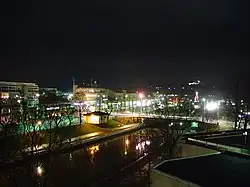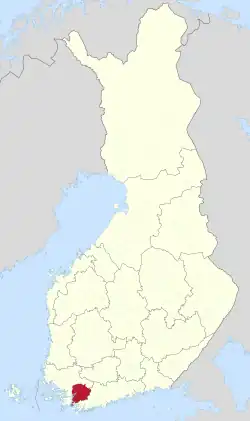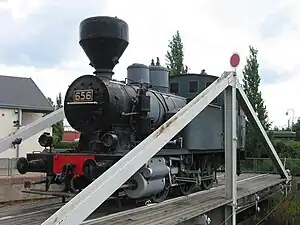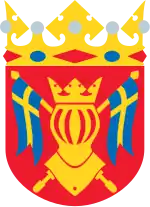Salo, Finland
Salo (Finnish pronunciation: [ˈsɑlo]) is a town and municipality of Finland. It is located in the Southwest Finland region. The municipality has a population of 51,057[2] (September 19, 2023) and covers an area of 2,168.30 square kilometres (837.19 sq mi) of which 181.78 km2 (70.19 sq mi) is water.[1] The population density is 25.7/km2 (67/sq mi). The municipality is unilingually Finnish.
Salo | |
|---|---|
City | |
| Salon kaupunki Salo stad | |
 Salo town centre by night | |
 Coat of arms | |
 Location of Salo in Finland | |
| Coordinates: 60°23′10″N 023°07′30″E | |
| Country | |
| Region | Southwest Finland |
| Sub-region | Salo |
| Market town | 1887 |
| City rights | 1960 |
| Government | |
| • City manager | Tero Nissinen |
| Area (2018-01-01)[1] | |
| • City | 2,168.30 km2 (837.19 sq mi) |
| • Land | 1,986.49 km2 (766.99 sq mi) |
| • Water | 181.78 km2 (70.19 sq mi) |
| • Rank | 30th largest in Finland |
| Population (2023-09-19)[2] | |
| • City | 51,057 |
| • Rank | 20th largest in Finland |
| • Density | 25.7/km2 (67/sq mi) |
| • Metro | 64,650 |
| Population by native language | |
| • Finnish | 91.7% (official) |
| • Swedish | 1.2% |
| • Others | 7.1% |
| Population by age | |
| • 0 to 14 | 14% |
| • 15 to 64 | 58.2% |
| • 65 or older | 27.8% |
| Time zone | UTC+02:00 (EET) |
| • Summer (DST) | UTC+03:00 (EEST) |
| Climate | Dfb |
| Website | www.salo.fi |
In Finnish salo means woodland, backwoods but also a wooded island. It is thought that Salo has meant the island that over thousand years ago existed to the south of the current town but is today (due to the post-glacial rebound typical in the area) a hill, not even very close to the sea.[5]
Salo is located between the capital Helsinki (distance 114 kilometres (71 mi)) and the provincial capital Turku (distance 52 kilometres (32 mi)), making it a busy small city. The short distance from these bigger cities keeps the Salo region and its business life growing. Farming also plays a considerable part in the area. Salo's neighbouring municipalities are Koski Tl, Lohja, Kimitoön, Marttila, Paimio, Raseborg, Sauvo and Somero. It also is sister cities with Saint Anthony Village of Minnesota.
Once the town's main claim to fame, Salo had a large consumer electronics and mobile phone industry, with a manufacturing plant operated by Nokia and briefly by Microsoft Mobile in the 2010s until it was shut down. Nokia was once the dominant employer in the town, and the plant's closure in 2015 has led to high unemployment.
Salo is the birthplace of the president of Finland Sauli Niinistö.
History
Salo has existed as a centre of rural commerce since at least the 16th century, emerging in the location where the Great Coastal Road,[6] the important East-West road, crossed River Salo; the river provided the fairway to the sea. In 1887 Salo officially became a market town and, in the beginning of 1891, an independent municipality.[7] The area of the municipality was initially very small, only 0.65 km². In 1932 it grew to 18 km² when areas from neighbouring Uskela and Halikko were annexed to Salo. Eventually Salo became a town in 1960. The municipality of Uskela was consolidated with Salo 1967. The municipalities of Halikko, Kiikala, Kisko, Kuusjoki, Muurla, Perniö, Pertteli, Suomusjärvi and Särkisalo were consolidated with Salo in the beginning of 2009. Salo is also a popular last name in Finland.
Climate
| Climate data for Salo Kärkkä (elevation 47 m) 1991-2020 normals, extremes 1959- present | |||||||||||||
|---|---|---|---|---|---|---|---|---|---|---|---|---|---|
| Month | Jan | Feb | Mar | Apr | May | Jun | Jul | Aug | Sep | Oct | Nov | Dec | Year |
| Record high °C (°F) | 8.9 (48.0) |
9.2 (48.6) |
16.4 (61.5) |
23.8 (74.8) |
29.6 (85.3) |
31.9 (89.4) |
33.2 (91.8) |
32.5 (90.5) |
27.5 (81.5) |
18.5 (65.3) |
14.0 (57.2) |
10.8 (51.4) |
33.2 (91.8) |
| Average high °C (°F) | −1.0 (30.2) |
−1.3 (29.7) |
2.9 (37.2) |
9.8 (49.6) |
16.3 (61.3) |
20.2 (68.4) |
23.0 (73.4) |
21.4 (70.5) |
16.0 (60.8) |
9.1 (48.4) |
3.9 (39.0) |
0.9 (33.6) |
10.1 (50.2) |
| Daily mean °C (°F) | −3.8 (25.2) |
−4.5 (23.9) |
−1.3 (29.7) |
4.5 (40.1) |
10.5 (50.9) |
15.0 (59.0) |
17.8 (64.0) |
16.2 (61.2) |
11.2 (52.2) |
5.7 (42.3) |
1.6 (34.9) |
−1.4 (29.5) |
6.0 (42.8) |
| Average low °C (°F) | −7.0 (19.4) |
−8.0 (17.6) |
−5.2 (22.6) |
−0.2 (31.6) |
4.7 (40.5) |
9.6 (49.3) |
12.6 (54.7) |
11.3 (52.3) |
7.2 (45.0) |
2.6 (36.7) |
−0.8 (30.6) |
−4.2 (24.4) |
1.9 (35.4) |
| Record low °C (°F) | −36.6 (−33.9) |
−37.5 (−35.5) |
−32.5 (−26.5) |
−21.5 (−6.7) |
−6.9 (19.6) |
−0.9 (30.4) |
2.0 (35.6) |
0.1 (32.2) |
−7.9 (17.8) |
−16.5 (2.3) |
−22.6 (−8.7) |
−34.1 (−29.4) |
−37.5 (−35.5) |
| Source 1: FMI temperature normals for Finland 1991-2020[8] | |||||||||||||
| Source 2: Record highs and lows 1959- present[9] | |||||||||||||
Demographics
Population
The city of Salo has 51,057 inhabitants, making it the 20th most populous municipality in Finland. The Salo region has a population of 59,493. In Salo, 7.4% of the population has a foreign background, which is slightly below the national average.[10]
| Year | Population |
|---|---|
| 1990 | 49,834 |
| 1995 | 50,922 |
| 2000 | 52,604 |
| 2005 | 53,672 |
| 2010 | 55,235 |
| 2015 | 53,890 |
| 2020 | 51,562 |
Languages
Population by mother tongue (2022)[10]
Salo is a monolingual Finnish-speaking municipality. The majority of the population - 46,698 people or 91.7% - speak Finnish as their first language. In Salo, 596 people, or 1.2% of the population, speak Swedish.[10] 7.1% of the population of Salo have a mother tongue other than Finnish or Swedish.[10] As English and Swedish are compulsory school subjects, functional bilingualism or trilingualism acquired through language studies is not uncommon.
At least 30 different languages are spoken in Salo. The most common foreign languages are Russian (1.7%), Estonian (1.4%), Kurdish (0.5%) and Albanian (0.4%).[10]
Immigration
| Population by country of birth (2022)[10] | ||
| Nationality | Population | % |
|---|---|---|
| 47,428 | 93.1 | |
| 748 | 1.5 | |
| 590 | 1.2 | |
| 223 | 0.4 | |
| 198 | 0.4 | |
| 133 | 0.3 | |
| 121 | 0.2 | |
| 111 | 0.2 | |
| 106 | 0.2 | |
| 98 | 0.2 | |
| 96 | 0.2 | |
| Other | 1,081 | 2.1 |
In 2022, there were 3,758 persons with a migrant background living in Salo, or 7.4% of the population.[note 1] The number of residents who were born abroad was 3,505, or 6.9% of the population. The number of persons with foreign citizenship living in Salo was 2,462.[12] Most foreign-born citizens came from the former Soviet Union, Estonia, Sweden and Iraq.[10]
The relative share of immigrants in Salo's population is slightly below the national average. However, the city's new residents are increasingly of foreign origin. This will increase the proportion of foreign residents in the coming years.
Religion
In 2022, the Evangelical Lutheran Church was the largest religious group with 72.1% of the population of Salo. Other religious groups accounted for 1.8% of the population. 26.2% of the population had no religious affiliation.[10]
Industry
Salo was well known in Finland and around the world for its large mobile phone factory operated by Nokia. Nokia first started producing mobile phones in Salo in 1981. A new plant, 15,000 square metres, opened in June 1995. By this time 1,200 people were employed there, and it exported products to 70 countries as of 1995.[13] As of 2008, 5,000 people were employed at the plant.[14]
In 2012 amid heavy financial losses, Nokia laid off a third of Salo's 3,500 workforce and gradually shifted manufacturing to Asia. It had a negative impact on the town with unemployment rising. In 2010 Nokia accounted for 95% of the town's corporate tax income, amounting to €60 million, but this dropped to just €14 million by 2012.[15] By the end of the year Salo no longer produced hardware and became a research and development centre.
After the centre was in the hands of Microsoft Mobile, layoffs continued and eventually in June 2015 Microsoft announced the closure of the plant, putting the jobs of the 1,100 employees at risk. By this time Salo's unemployment rate was 15%, and the layoffs could push that further to 20%. Solidarity was expressed by some Finnish politicians after Salo's decline, which also came amid Finland's slow post-2008 crisis economy.[16]
Sports
The city is home to the professional basketball team Salon Vilpas Vikings, which plays in the Finish 1st Division Korisliiga. It plays its home games in the Salohalli. The most important orienteering club is Angelniemen Ankkuri, which organizes the Halikko relay every autumn.
Transportation

European route E18 runs through Salo, passing the city center a few kilometers North, but the national road 52 between Raseborg and Somero goes through the city center. The "Coastal Railway" from Helsinki to Turku and further to Turku Harbour crosses the town center; all InterCity trains and most of the high-speed Pendolino trains stop at Salo railway station. The closest airports are Turku Airport (limited number of domestic and international flights) and Helsinki-Vantaa Airport.

In 2016, the city of Salo signed a letter of intent with Los Angeles-based company Virgin Hyperloop One in order to launch a project to build a 50 km long Hyperloop tube between Salo and Turku.[17]
Events
In recent years, the town of Salo has become known for the popular Kurpitsaviikot ("Pumpkin Weeks"), which are organized in Halikko in every autumn.[18] At the local field, thousands of different sizes pumpkins and carved jack-o'-lanterns are presented to tourists.[19][20][21][22] The event celebrating Halloween culture has gathered audiences from all over Finland, from Hanko to Ivalo,[23][19][20] and for example, the event organized in 2020 had as many as 100,000 visitors.[24] The event has also been noticed abroad, all the way to North America.[25]
International relations
Notes
- Statistics Finland classifies a person as having a "foreign background" if both parents or the only known parent were born abroad.[11]
References
- "Area of Finnish Municipalities 1.1.2018" (PDF). National Land Survey of Finland. Retrieved 30 January 2018.
- "Finland's preliminary population figure was 5,587,841 at the end of August 2023". StatFin. Statistics Finland. Retrieved 30 September 2023.
- "Demographic Structure by area as of 31 December 2022". Statistics Finland's PX-Web databases. Statistics Finland. Retrieved 6 September 2023.
- "Population according to age (1-year) and sex by area and the regional division of each statistical reference year, 2003–2020". StatFin. Statistics Finland. Retrieved 2 May 2021.
- Paikkala, Sirkka (2018-06-19). "Etunimien ajankuva". Virittäjä. 122 (2). doi:10.23982/vir.68985. ISSN 2242-8828.
- Forbes, Elizabeth (2001). Salminen, Matti. Oxford Music Online. Oxford University Press. doi:10.1093/gmo/9781561592630.article.41977.
- Alifrosti, Kari (1996). "Salon ja Uskelan historia 1869-1990", Salon Kaupunki. ISBN 951-96152-1-0.
- "FMI normals 1991-2020". fmi.fi. Retrieved 25 April 2023.
- "FMI open data". FMI. Retrieved 25 April 2023.
- "Number of foreign-language speakers grew by nearly 38,000 persons". Statistics Finland. 31 May 2023. Retrieved 12 September 2023.
- "Persons with foreign background". Statistics Finland. Retrieved 18 September 2023.
- "Population structure 2000-2022, urban-rural classification". Statistics Finland. 26 May 2023. Retrieved 12 September 2023.
- "Nokia's New Mobile Phones Factory Opened in Salo - Nokia". Nokia. Retrieved 24 December 2017.
- "Lines go silent in Finnish town of Salo as Microsoft shuts Nokia phone". Uk.reuters.com. Retrieved 24 December 2017.
- "Nokia layoffs have big impact on small town in Finland". Theverge.com. Retrieved 24 December 2017.
- "Microsoft has crushed the economic hopes of Finland's Salo as it closes its Nokia plant and jeopardises 1,100 jobs". Uk.businessinsider.com. Retrieved 24 December 2017.
- "Hyperloop between Finland, Sweden would cost €19bn". www.helsinkitimes.fi. Retrieved 2021-01-27.
- "Kurpitsaviikot". Facebook. Retrieved 5 November 2022.
- Halonen, Antti (16 October 2020). "Halikkolaista peltoa valaisee tuhat upeaa kurpitsalyhtyä: "Piristystä pimenevään syksyyn"". Iltalehti (in Finnish). Retrieved 5 November 2022.
- Vilen, Janica (22 October 2020). "Halikko muuttui halloween-kyläksi". Haloo maaseutu (in Finnish). Retrieved 5 November 2022.
- Kauppinen, Kari (27 October 2019). "Upea näky: Yli 500 kurpitsaa hohtaa pellolla – "Salo taitaa olla nyt Suomen amerikkalaisin kaupunki"". Iltalehti (in Finnish). Retrieved 5 November 2022.
- Filppu, Minna (11 October 2022). ""Aivan absurdi paikka!" – helsinkiläiset taivastelivat kurpitsajuhlia Salossa Rannikon pellon reunassa". Salon Seudun Sanomat (in Finnish). Retrieved 5 November 2022.
- Rosvall, Minna (12 October 2022). "Salon kurpitsapuistossa väkeä jo Hangosta Ivaloon – ukrainalaisten koristelemat kurpitsat ihastuttavat". Yle (in Finnish). Retrieved 5 November 2022.
- Rosvall, Minna (13 October 2021). "Kurpitsat hehkuvat läpi yön halikkolaisella pellolla – someilmiö kiinnosti viime vuonna 100 000 kävijää". Yle (in Finnish). Retrieved 5 November 2022.
- Naakka, Anna-Maija (13 October 2021). "Pellolle ilmestyi karmivankaunis näky, joka hämmästyttää ulkomailla asti: "On villinnyt koko Salon"". Ilta-Sanomat (in Finnish). Retrieved 5 November 2022.
- "Kahdenkeskiset kaupunkisuhteet" (in Finnish). City of Salo. Retrieved 22 August 2019.
Photo gallery
 Wooden Salo Church
Wooden Salo Church Municipal library. The new library building has been designed to fit in the environment of old wooden houses.
Municipal library. The new library building has been designed to fit in the environment of old wooden houses. Salo River at night
Salo River at night.jpg.webp) Lake Lahnajärvi in the former Suomusjärvi municipality in Salo.
Lake Lahnajärvi in the former Suomusjärvi municipality in Salo. Microsoft premises in Salo.
Microsoft premises in Salo. Apartment building along Turuntie.
Apartment building along Turuntie. Art gallery in the old locomotive shed.
Art gallery in the old locomotive shed. Nokia building in Salo in 2002
Nokia building in Salo in 2002
External links
- Town of Salo – Official website
